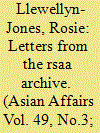| Srl | Item |
| 1 |
ID:
160677


|
|
|
|
|
| Summary/Abstract |
In 2004 a collection of thirty-four letters from the Silk Road explorer Sir Aurel Stein was found in the archives of the Royal Society for Asian Affairs and catalogued, although not transcribed or studied. Neither of Stein's biographers, Jeannette Mirsky (published 1977), nor Annabel Walker (published 1995) knew about these letters, and there are no references to them in more recent publications either. What is perhaps even more interesting is that the Society's letters are addressed to a man whose name does not appear in any published works on Stein; a man who remains an elusive figure more than half a century after his death – Colonel Reginald Schomberg D.S.O. (1880-1958), an explorer and spy. This article analyses the contents of the letters, which shed light on a secret mission undertaken by Schomberg in Chinese Central Asia in the early 1930s.
|
|
|
|
|
|
|
|
|
|
|
|
|
|
|
|
| 2 |
ID:
073383


|
|
|
|
|
| Publication |
2006.
|
| Summary/Abstract |
In contemporary China, conditions for doing fieldwork are increasingly dependent on locality. Access to the Xinjiang Uyghur Autonomous Region has come under repeated threat as a series of domestic and international events (the pro-democracy campaign and Tian'anmen incident of 1989, the collapse of Marxist-Leninist parties in Eastern Europe in 1989, the Baren uprising of April 1990 in south Xinjiang, the formation of independent Central Asian states in 1991, the Ghulja riots of February 1997, and the events of 11 September 2001) in turn affected local conditions. Researchers and journalists have subsequently come under intense state scrutiny. Yet state politics are only one facet of the difficulties faced in Chinese Central Asia; this article also explores the personal "politics" of gender, culture, religion and values as these affect the negotiation of research roles. It is about operating within shifting margins: the margins of the state, gender margins, inter-cultural and religious margins. The discussion, drawing on a total of fifteen months' research conducted between 1995 and 2004, may prepare first-time ethnographers for the field experience in Xinjiang, while also allowing seasoned researchers to share methodologies, and may be relevant to other sensitive research settings as well.
|
|
|
|
|
|
|
|
|
|
|
|
|
|
|
|